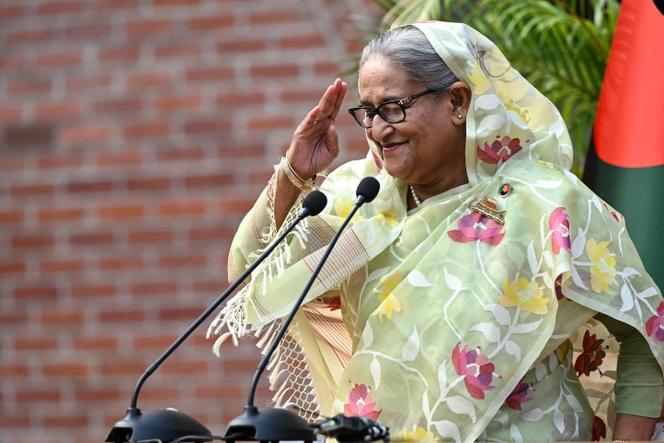Former Prime Minister Sheikh Hasina was sentenced to death in absentia on Monday by the International Crimes Tribunal in Dhaka for her role in the violent suppression of student-led protests in July – August 2024.
Her former Home Minister, Asaduzzaman Khan Kamal, was also handed a death sentence.
The tribunal found Hasina, 78, guilty on three counts, including incitement of violence, ordering killings, and failing to prevent atrocities during the uprising, which left an estimated 1,400 people dead and thousands injured, according to a United Nations report.
Join our WhatsApp ChannelFamilies of victims in the courtroom cheered and prayed after the announcement, marking one of the harshest sentences against a leader in Bangladesh’s history.
Hasina, who fled to India during the protests, called the verdict a “foregone conclusion” and labeled the tribunal a “rigged court” controlled by political adversaries. She accused the interim government of trying to remove the Awami League from the political arena ahead of elections scheduled for February 2026.
READ ALSO : Ex-Bangladesh PM, Hasina, Accuses US Of Plotting Her Downfall
Bangladesh Chief of Naval Staff stresses need for peace in South Sudan during first visit to UNMISS
The interim government, led by Nobel laureate Muhammad Yunus, hailed the ruling as “historic” but urged calm, warning that any attempts to create disorder would be met with strict action. Ahead of the verdict, Bangladesh saw at least 30 crude bomb explosions and 26 vehicles torched, though no casualties were reported.
United Nations Response
The United Nations has described the verdict as an “important moment for victims” of the 2024 crackdown.
The Office of the UN High Commissioner for Human Rights (OHCHR) noted that perpetrators in positions of leadership should be held accountable according to international standards and emphasized that victims must have access to remedies and reparations.
While the UN stressed it was not privy to the trial, it called for all accountability proceedings, particularly those involving international crimes, to meet international standards of due process and fair trial.
The UN also expressed regret over the imposition of the death penalty, which it opposes in all circumstances.
High Commissioner Volker Türk urged Bangladesh to pursue a comprehensive process of truth-telling, reparations, and justice to facilitate national reconciliation and healing. He highlighted the need for transformative security sector reforms to prevent future violations, and offered the UN’s support to the government and people of Bangladesh in these efforts.
Türk also called for calm and restraint in response to the verdict.
International and Regional Reactions
Bangladesh’s foreign ministry called on India to extradite Hasina and Khan Kamal. India, however, stated it had “taken note” of the verdict and would engage constructively with all stakeholders in the interest of Bangladesh’s peace, democracy, and stability, without committing to extradition.
Analysts note that the 2013 extradition treaty provides grounds for India to refuse the request, as political offences are exempt and allegations must be made in good faith.
Human rights groups welcomed the recognition of victims’ suffering but raised concerns about trials in absentia and the death penalty, emphasizing that justice must meet human rights standards.
The verdict marks a pivotal moment in Bangladesh’s political history and accountability framework. Analysts warn that ensuring fair and inclusive elections, rebuilding public trust, and instituting institutional reforms will be critical to prevent political instability in the coming months.
Amanze Chinonye is a Staff Correspondent at Prime Business Africa, a rising star in the literary world, weaving captivating stories that transport readers to the vibrant landscapes of Nigeria and the rest of Africa. With a unique voice that blends with the newspaper's tradition and style, Chinonye's writing is a masterful exploration of the human condition, delving into themes of identity, culture, and social justice. Through her words, Chinonye paints vivid portraits of everyday African life, from the bustling markets of Nigeria's Lagos to the quiet villages of South Africa's countryside . With a keen eye for detail and a deep understanding of the complexities of Nigerian society, Chinonye's writing is both a testament to the country's rich cultural heritage and a powerful call to action for a brighter future. As a writer, Chinonye is a true storyteller, using her dexterity to educate, inspire, and uplift readers around the world.
- Amanze Chinonye
- Amanze Chinonye
- Amanze Chinonye
- Amanze Chinonye
- Amanze Chinonye
- Amanze Chinonye
- Amanze Chinonye
- Amanze Chinonye
- Amanze Chinonye
- Amanze Chinonye
- Amanze Chinonye
- Amanze Chinonye
- Amanze Chinonye
- Amanze Chinonye
- Amanze Chinonye
- Amanze Chinonye
- Amanze Chinonye
- Amanze Chinonye
- Amanze Chinonye
- Amanze Chinonye
- Amanze Chinonye
- Amanze Chinonye
- Amanze Chinonye
- Amanze Chinonye
- Amanze Chinonye
- Amanze Chinonye
- Amanze Chinonye
- Amanze Chinonye
- Amanze Chinonye
- Amanze Chinonye
- Amanze Chinonye
- Amanze Chinonye
- Amanze Chinonye
- Amanze Chinonye
- Amanze Chinonye
- Amanze Chinonye
- Amanze Chinonye
- Amanze Chinonye
- Amanze Chinonye
- Amanze Chinonye
- Amanze Chinonye
- Amanze Chinonye
- Amanze Chinonye
- Amanze Chinonye
- Amanze Chinonye
- Amanze Chinonye
- Amanze Chinonye
- Amanze Chinonye
- Amanze Chinonye
- Amanze Chinonye
- Amanze Chinonye
- Amanze Chinonye
- Amanze Chinonye
- Amanze Chinonye
- Amanze Chinonye
- Amanze Chinonye
- Amanze Chinonye
- Amanze Chinonye
- Amanze Chinonye
- Amanze Chinonye
- Amanze Chinonye
- Amanze Chinonye
- Amanze Chinonye
- Amanze Chinonye
- Amanze Chinonye
- Amanze Chinonye
- Amanze Chinonye
- Amanze Chinonye
- Amanze Chinonye
- Amanze Chinonye
- Amanze Chinonye
- Amanze Chinonye
- Amanze Chinonye
- Amanze Chinonye
- Amanze Chinonye
- Amanze Chinonye
- Amanze Chinonye
- Amanze Chinonye
- Amanze Chinonye
- Amanze Chinonye
- Amanze Chinonye
- Amanze Chinonye
- Amanze Chinonye
- Amanze Chinonye
- Amanze Chinonye
- Amanze Chinonye
- Amanze Chinonye
- Amanze Chinonye
- Amanze Chinonye
- Amanze Chinonye
- Amanze Chinonye
- Amanze Chinonye
- Amanze Chinonye
- Amanze Chinonye
- Amanze Chinonye
- Amanze Chinonye
- Amanze Chinonye
- Amanze Chinonye
- Amanze Chinonye
- Amanze Chinonye
- Amanze Chinonye
- Amanze Chinonye
- Amanze Chinonye
- Amanze Chinonye
- Amanze Chinonye
- Amanze Chinonye
- Amanze Chinonye
- Amanze Chinonye
- Amanze Chinonye
- Amanze Chinonye
- Amanze Chinonye
- Amanze Chinonye
- Amanze Chinonye
- Amanze Chinonye
- Amanze Chinonye
- Amanze Chinonye
- Amanze Chinonye
- Amanze Chinonye
- Amanze Chinonye
- Amanze Chinonye
- Amanze Chinonye
- Amanze Chinonye
- Amanze Chinonye
- Amanze Chinonye













